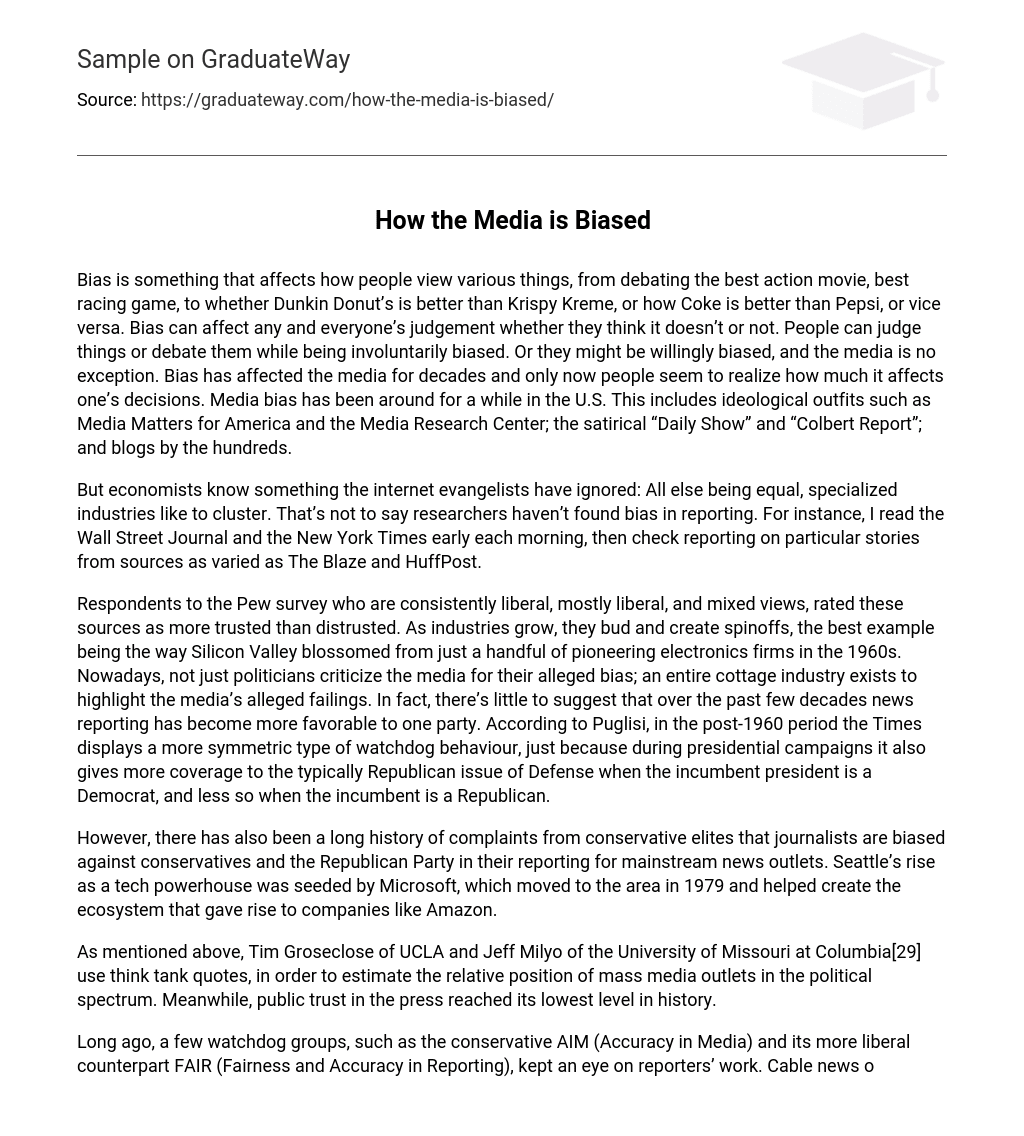Bias is something that affects how people view various things, from debating the best action movie, best racing game, to whether Dunkin Donut’s is better than Krispy Kreme, or how Coke is better than Pepsi, or vice versa. Bias can affect any and everyone’s judgement whether they think it doesn’t or not. People can judge things or debate them while being involuntarily biased. Or they might be willingly biased, and the media is no exception. Bias has affected the media for decades and only now people seem to realize how much it affects one’s decisions. Media bias has been around for a while in the U.S. This includes ideological outfits such as Media Matters for America and the Media Research Center; the satirical “Daily Show” and “Colbert Report”; and blogs by the hundreds.
But economists know something the internet evangelists have ignored: All else being equal, specialized industries like to cluster. That’s not to say researchers haven’t found bias in reporting. For instance, I read the Wall Street Journal and the New York Times early each morning, then check reporting on particular stories from sources as varied as The Blaze and HuffPost.
Respondents to the Pew survey who are consistently liberal, mostly liberal, and mixed views, rated these sources as more trusted than distrusted. As industries grow, they bud and create spinoffs, the best example being the way Silicon Valley blossomed from just a handful of pioneering electronics firms in the 1960s. Nowadays, not just politicians criticize the media for their alleged bias; an entire cottage industry exists to highlight the media’s alleged failings. In fact, there’s little to suggest that over the past few decades news reporting has become more favorable to one party. According to Puglisi, in the post-1960 period the Times displays a more symmetric type of watchdog behaviour, just because during presidential campaigns it also gives more coverage to the typically Republican issue of Defense when the incumbent president is a Democrat, and less so when the incumbent is a Republican.
However, there has also been a long history of complaints from conservative elites that journalists are biased against conservatives and the Republican Party in their reporting for mainstream news outlets. Seattle’s rise as a tech powerhouse was seeded by Microsoft, which moved to the area in 1979 and helped create the ecosystem that gave rise to companies like Amazon.
As mentioned above, Tim Groseclose of UCLA and Jeff Milyo of the University of Missouri at Columbia[29] use think tank quotes, in order to estimate the relative position of mass media outlets in the political spectrum. Meanwhile, public trust in the press reached its lowest level in history.
Long ago, a few watchdog groups, such as the conservative AIM (Accuracy in Media) and its more liberal counterpart FAIR (Fairness and Accuracy in Reporting), kept an eye on reporters’ work. Cable news outlets enjoyed similar gains in 2016, marking it as their best year ever. citizens think that Democratic candidates would be better at handling problems related to them. Congress who quote them in a non-negative way. So, how much do we expect the tone of coverage to change in response to a 0.5 percent increase in the unemployment rate for Democratic and Republican administrations with the same starting unemployment rate?
The network wasn’t alone. Consequently, these allegations cannot be so easily dismissed. If the news media is a watchdog for worsening economic conditions, they appear to only do so during Republican presidencies.
With this in mind, we might expect journalists to react more negatively to short-term, worsening economic conditions during Republican presidencies if there is partisan bias in the news media. Car companies didn’t arise in remote regions that needed cars—they arose in Detroit, which already had heavy industry, was near natural resources, boasted a skilled workforce and was home to a network of suppliers that could help car companies thrive. These results are shown in Figure 3, which plots the estimated change in average media tone in response to changes in the unemployment (left panel) and inflation rate (right panel). They have, but they don’t agree that one side is consistently favored or that this favoritism has been growing like a pernicious weed.
I find that only Republican administrations are treated with more negative coverage in response to short-term increases in unemployment or the inflation rate. These topics are classified as Democratic ones, because Gallup polls show that on average U.S. Mostly conservatives rated them as about equally trusted as distrusted; Consistently conservatives rated them as more distrusted than trusted.
Riccardo Puglisi of the Massachusetts Institute of Technology looks at the editorial choices of the New York Times from 1946 to 1997.[37] He finds that the Times displays Democratic partisanship, with some watchdog aspects. There is evidence that most journalists identify with the Democratic Party and as ideological liberals. Using this procedure, Groseclose and Milyo obtain the stark result that all sampled news providers -except Fox News’ Special Report and the Washington Times- are located to the left of the average Congress member, i.e. there are signs of a liberal bias in the US news media.
Then we need to seek out a variety of positions and to consider viewpoints that contradict our own. The idea is to trace out which think tanks are quoted by various mass media outlets within news stories, and to match these think tanks with the political position of members of the U.S. This is the case, because during presidential campaigns the Times systematically gives more coverage to Democratic topics of civil rights, health care, labor and social welfare, but only when the incumbent president is a Republican.





